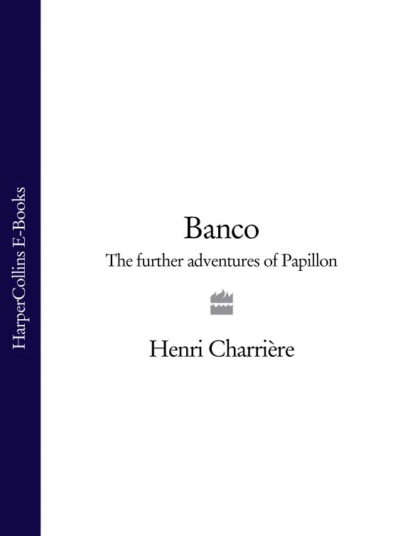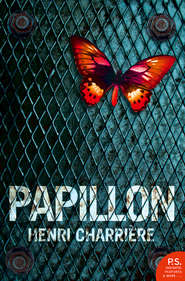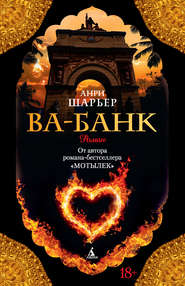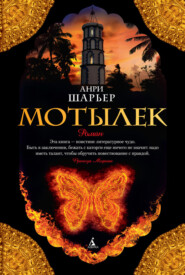По всем вопросам обращайтесь на: info@litportal.ru
(©) 2003-2025.
✖
Banco: The Further Adventures of Papillon
Настройки чтения
Размер шрифта
Высота строк
Поля
With all his clean things carefully made up into a bundle, Picolino wept bitterly, and his movements and the hoarse sounds he uttered conveyed his wretchedness at not being able to bring out the millions of thanks he had in his heart. I led him away.
Carrying our baggage, we reached the driver’s place. A splendid exit from the town, all right: his truck had broken down; no leaving today. We had to wait for a new carburettor. There was no way out of it – I returned to Maria’s with Picolino. You can imagine the shrieks when they saw us coming back.
‘God was kind to have broken the truck, Enrique! Leave Picolino here and walk around the village while I get the meal ready. It’s an odd thing,’ Maria added, ‘but it could be you’re not fated to go to Caracas.’
While I was strolling about I thought over this remark of Maria’s. It worried me. I did not know Caracas, a big city, but people had talked about it and I could imagine what it was like. The idea certainly attracted me; but once I was there, what should I do, and how could I do it?
I walked slowly across the square of El Callao with my hands behind my back. The sun was blazing down. I went over to an almendron, a huge, very leafy tree, to shelter from the furious heat. Under the shade there stood two mules, and a little old man was loading them. I noticed the diamond-prospector’s sieve and the gold-prospector’s trough, a kind of Chinese hat they use to wash the gold-bearing mud in. As I gazed at these things – they were still new to me – I went on pondering. In front of me there was this biblical picture of a quiet, peaceful life with no sounds apart from those of nature and the patriarchal way of living; and I thought of what it must be like at that very moment in Caracas, the busy, teeming capital that drew me on. All the descriptions I had heard turned into exact images. After all, it was fourteen years since I had seen a big town! Since I could now do as I liked, there was no doubt about it – I was going to get there, and as quick as I could.
3: Jojo La Passe (#ulink_af0c9168-0373-5e40-9201-a9b35438f0c1)
JESUS, the song was in French! And it was the little old prospector singing. I listened.
The old sharks are there already
They’ve smelt the body of a man.
One of them chews an arm like an apple
Another eats his trunk and tra-la-la
The quickest gets it, the rest have none
Convict farewell; long live the law!
I was thunderstruck. He sang it slowly, like a requiem. The ‘tra-la-la’ had an ironic merriment, and the ‘long live the law’ was full of the mockery of the Paris underworld: it sounded like an unanswerable truth. But to feel the full irony of it you had to have been there.
I looked closely at the man. The size of three apples one on top of the other: just five foot one, I learnt afterwards. One of the most picturesque ex-convicts I had ever come across. Snowy white hair with long, grey side-whiskers cut on the slant. Blue jeans; a big, broad leather belt; on the right, a long sheath with a curved handle coming out of it at the height of his groin. I walked over to him. He had no hat on – it was lying on the ground – so I could see his broad forehead, speckled with a red even darker than his old sun-baked pirate’s tan. His eyebrows were so long and thick he surely had to comb them. Beneath them, steely grey-green eyes, gimlets that bored through me. I hadn’t taken four steps before he said to me, ‘You come from penal, as sure as my name’s La Passe.’
‘Right. My name’s Papillon.’
‘I’m Jojo La Passe.’ He held out his hand and took mine frankly, just as it should be between men, not so hard it crushes your fingers the way the show-offs do, nor too flabby, like hypocrites and fairies. I said, ‘Let’s go to the bar and have a drink. It’s on me.’
“No. Come to my place over the way, the white house. It’s called Belleville, after where I lived when I was a kid. We can talk there in peace.’
Indoors it was swept and clean – his wife’s field of action. She was young, very young; perhaps twenty-five. He – God knows: sixty at least. She was called Lola, a dusky Venezuelan.
‘You’re welcome,’ she said to me, with a pleasant smile.
‘Thanks.’
‘Two pastis,’ said Jojo. ‘A Corsican brought me two hundred bottles from France. You’ll see whether it’s good or not.’
Lola poured it out and Jojo tossed back three-quarters of his glass in one gulp. ‘Well?’ said he, fixing me with his eye.
‘Well what? You don’t think I’m going to tell you the story of my life, do you?’
‘OK, mate. But Jojo La Passe, doesn’t that ring any bells?’
‘No.’
‘How quickly they forget you! Yet I was a big shot in penal. There was no one that came within miles of me for throwing the seven and eleven with dice just touched with a file – not loaded, of course. That wasn’t yesterday, to be sure; but after all, men like us, we leave traces – we leave legends. And now according to what you tell me, in a few years it’s all forgotten. Did not one single bastard ever tell you about me?’ He seemed deeply outraged.
‘Frankly, no.’
Once again the gimlets bored right into my guts. ‘You stayed no great time in penal: you’ve scarcely got the face at all.’
‘Thirteen years altogether, counting El Dorado. You think that’s nothing?’
‘It’s not possible. You’re scarcely marked, and only another con could tell that’s where you come from. And even then, a con who was not a diabolically clever face-reader might get it wrong. You had it easy in penal, right?’
‘It wasn’t as easy as all that: the islands; solitary.’
‘Balls, man, balls! The islands – they’re a holiday camp! All they lack is a casino. For you, penal meant the sea-breeze, crayfish, no mosquitoes, fishing, and now and then a real treat – the pussy or the arse of some screw’s wife kept too short of it by her bastard of a husband.’
‘Still, you know…’
‘Blah-blah-blah: don’t you try to fool me. I know all about it. I wasn’t on the islands, but I’ve been told about them.’ This man, maybe he was picturesque, but things were likely to turn nasty for him: I felt my temper rising fast. He went on, ‘Penal, the real penal, was Kilometre 24. That doesn’t mean anything to you? No, it doesn’t, and that’s for sure. With your mug, you’ve certainly never pissed in those parts. Well, mate, I have. A hundred men, every one of them with diseased guts. Some standing, some lying down, some groaning like dogs. There’s the bush in front of them, like a wall. But it’s not them that are going to cut the bush down: it’s the bush that’s going to do the cutting. It’s not a working camp. As the prison administration puts it, Kilometre 24 is a conveniently hidden little dell in the Guiana forest – you toss men into it and they never bother you again. Come, Papillon; don’t try and stuff me up with your islands and your solitary. It won’t wash with me. You’ve got nothing of the look of a dog with all the spirit beaten out of it, nor the hollow face of a skin-and-bones lag with a life-sentence, nor the dial you see on all those poor buggers who escaped from that hell by some miracle – unfortunate sods who look as if they’d been worked over with a chisel to give them an old man’s face on a young man’s head. There’s nothing like that about you at all. So there’s no possible mistake about my diagnosis: for you, penal meant a holiday in the sun.’
How he did nag on and on, this little old bastard. I wondered how our meeting was going to end.
‘For me, as I’ve been telling you, it meant the hollow nobody ever comes out of alive – amoebic dysentery, a place where you gradually shit your guts out. Poor old Papillon: you didn’t even know what penal was all about.’
I looked closely at this terribly energetic little man, working out just where to plant my fist on his face, and then all at once I shifted into reverse and decided to make friends. No point in getting worked up: I might need him. ‘You’re right, Jojo. My penal didn’t amount to much, since I’m so fit it takes a really knowing type like you to tell where I come from.’
‘OK, we’re in agreement, then. What are you doing now?’
‘I’m working at the Mocupia gold-mine. Eighteen bolivars a day. But I’ve got a permit to go wherever I like; my confinamiento is over.’
‘I bet you want to light off for Caracas and go on the loose again.’
‘You’re right: that’s just what I want to do.’
‘But Caracas, it’s the big city; so trying to pull off anything there means a hell of a risk. You’re scarcely out, and you want to go back inside again?’
‘I’ve got a long bill for the sods who sent me down – the pigs, the witnesses, the prosecutor. A thirteen-year stretch for a crime I never committed: the islands, whatever you may think of them, and solitary at Saint-Joseph, where I went through the most horrible tortures the system could think up. And don’t forget I was only twenty-four when they framed me.’
‘Hell: so they stole the whole of your youth. Innocent, really innocent, cross your heart, or are you still pleading in the dock?’
‘Innocent, Jojo. I swear by my dead mother.’
‘Christ. Well, I see that must lay heavy on your chest. But you don’t have to go to Caracas if you want dough to straighten out your accounts – come with me.’
‘What for?’
‘Diamonds, man, diamonds! Here the government is generous: this is the only country in the world where you can burrow wherever you like for gold or diamonds. There’s only one thing: no machinery allowed. All they let you use is shovel, pickaxe and sieve.’
‘And where’s this genuine El Dorado? Not the one I’ve just come out of, I hope?’








